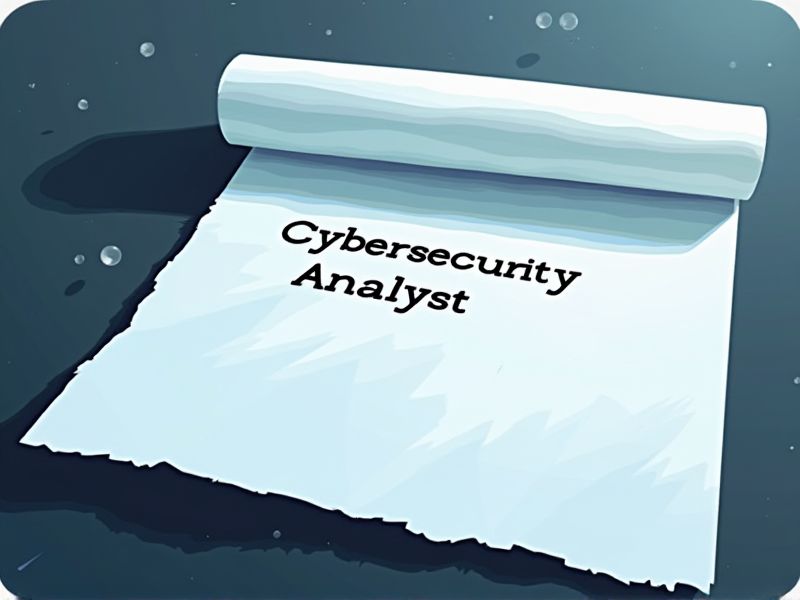
A cybersecurity analyst's role involves protecting an organization's systems and data from potential threats, a task requiring deep expertise and up-to-date knowledge. Certifications validate an analyst's skills and demonstrate their commitment to best practices in the industry. Employers often seek certified professionals to ensure they possess the necessary technical proficiency and ethical understanding. Here are some important certifications you may need as a cybersecurity analyst.
CompTIA Security+
CompTIA Security+ certification provides a foundational understanding of essential cybersecurity concepts, which is critical for any aspiring cybersecurity analyst. It ensures that professionals have the necessary skills to identify, address, and mitigate security threats effectively. As cybersecurity threats continue to evolve, the certification helps in keeping analysts updated on best practices and current security protocols. It is often a baseline requirement for many employers, establishing a standard of competency and knowledge in the cybersecurity field.
CompTIA CySA+
The CompTIA CySA+ certification equips cybersecurity analysts with practical skills to identify and combat undetected threats, enhancing their ability to protect organizational data. It provides a foundation in behavioral analytics, essential for understanding how malicious activities manifest in networks. This certification ensures analysts can efficiently use automated tools for monitoring and response, crucial for quick threat mitigation. Employers recognize CySA+ as a testament to an individual's capability to apply knowledge in real-world scenarios, reflecting a higher standard in cybersecurity competence.
Certified Information Systems Security Professional (CISSP)
The CISSP certification equips a Cybersecurity Analyst with a comprehensive understanding of security principles and practices, solidifying their expertise in the field. This credential is globally recognized, which can lead to increased job opportunities and potential career advancement. With a focus on a broad spectrum of security topics, the CISSP ensures analysts can effectively design, implement, and manage a strong cybersecurity program. Employers value the CISSP as it indicates a commitment to maintaining industry standards and staying up-to-date with current security threats and technologies.
Certified Ethical Hacker (CEH)
Organizations face growing threats from cybercriminals employing sophisticated tactics. A Certified Ethical Hacker (CEH) equips a Cybersecurity Analyst with the skills to anticipate and thwart these attacks by understanding the hacker's mindset. The CEH certification offers practical knowledge in identifying system vulnerabilities, enhancing the organization's defense mechanisms. A Cybersecurity Analyst with a CEH credential contributes to proactive threat detection and mitigation, protecting critical data and infrastructure.
GIAC Security Essentials (GSEC)
The GIAC Security Essentials (GSEC) certification equips cybersecurity analysts with a foundational understanding of core security concepts, which enhances their ability to identify and mitigate potential threats effectively. Organizations require certified analysts to ensure a standardized level of expertise and competence in managing and protecting critical information systems. GSEC certification validates an analyst's ability to perform hands-on skills and a practical understanding of information security beyond theoretical knowledge. By possessing the GSEC credential, cybersecurity analysts earn greater trust from employers, often leading to career advancement and more significant responsibilities.
Certified Information Security Manager (CISM)
Earning the Certified Information Security Manager (CISM) certification equips a cybersecurity analyst with advanced skills in managing, designing, and overseeing enterprise-level information security programs. This certification helps instill a deep understanding of risk management, which is crucial for identifying vulnerabilities and mitigating threats effectively. CISM-certified individuals demonstrate a comprehensive knowledge of information security governance, aligning cybersecurity strategies with organizational objectives. Holding this certification can enhance career prospects and credibility within the cybersecurity field, providing analysts with a competitive edge.
Certified Information Systems Auditor (CISA)
The CISA certification is crucial for a Cybersecurity Analyst because it demonstrates a robust understanding of auditing, control, and security practices, which are essential for risk management. Possessing a CISA indicates expertise in identifying vulnerabilities and implementing effective information security measures, enhancing an organization's defense mechanisms. Holding this certification signifies a professional's capability in adhering to global standards and frameworks crucial for maintaining cybersecurity integrity. Employers value CISA-certified analysts for their ability to ensure compliance with regulations, mitigate threats, and enhance the overall security posture of an organization.
EC-Council Certified Security Analyst (ECSA)
A structured approach to understanding and mitigating threats enhances a Cybersecurity Analyst's ability to defend networks effectively; the ECSA provides this essential framework. Practical skills gained through ECSA training reinforce an analyst's capacity to conduct thorough penetration tests, identifying system vulnerabilities in real-world scenarios. The certification ensures the analyst stays informed on current attack vectors and defense techniques, offering valuable insights into emerging threats. Holding an ECSA credential signals to employers a commitment to professional development, improving job prospects within competitive cybersecurity landscapes.
Offensive Security Certified Professional (OSCP)
The OSCP certification equips a Cybersecurity Analyst with practical, hands-on penetration testing skills, essential for identifying and mitigating vulnerabilities. Demonstrating proficiency in various attack vectors through OSCP enhances the analyst's problem-solving capabilities and analytical thinking. OSCP's rigorous training validates the analyst's ability to handle real-world cyber threats efficiently. Possessing OSCP can increase a cybersecurity professional's marketability and career advancement opportunities.
GIAC Certified Incident Handler (GCIH)
The GCIH certification equips a Cybersecurity Analyst with skills essential for effectively responding to and managing security incidents. Possession of this certification enhances an analyst's ability to detect, respond to, and recover from cyber threats efficiently. The credential validates critical knowledge of security threats, attack techniques, and strategies to protect organizational assets. Employers often value GCIH certification because it denotes a professional's expertise in incident handling procedures and tactics.
Summary
When you acquire certifications as a Cybersecurity Analyst, your expertise and credibility in the field are significantly enhanced. Employers often recognize certified professionals, leading to increased job opportunities and potential for higher salaries. You gain a deeper understanding of complex security systems, which can improve your problem-solving skills in critical situations. Continued education through certification keeps you updated with evolving trends, ensuring your skills remain relevant in the fast-changing cybersecurity landscape.
